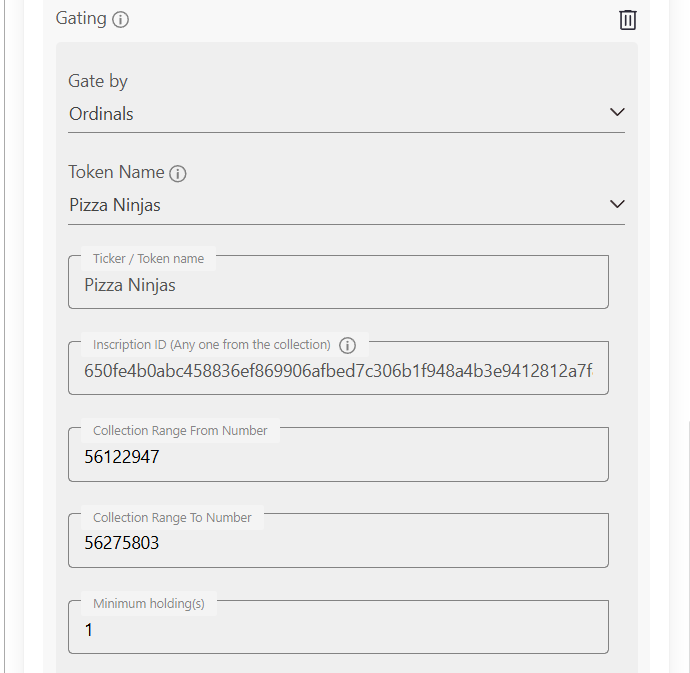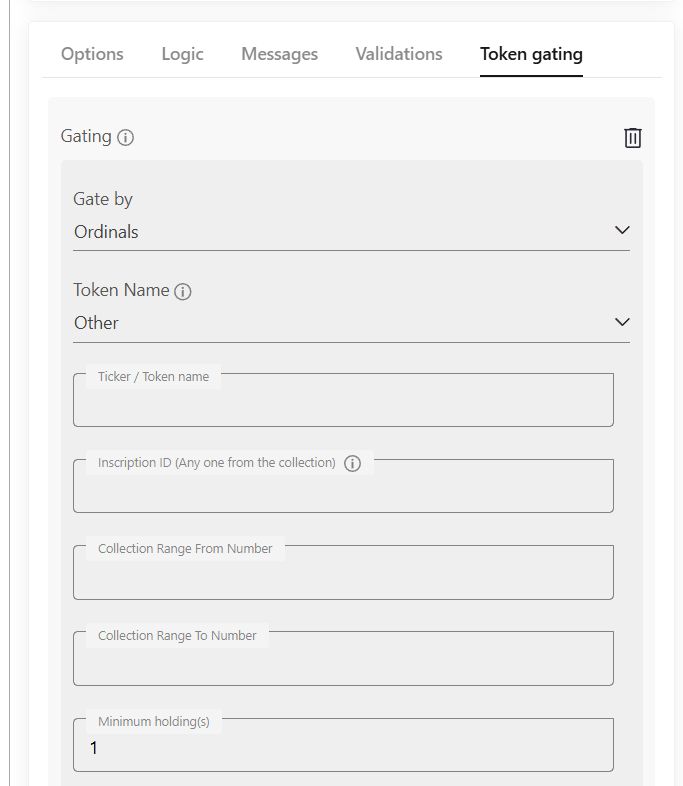Get insights.
Unlock value.
- 14-day free trial
- Set up in minutes
- No credit card required
How to token gate your forms and surveys for your ordinals project
Have you ever wondered if there was more to Bitcoin than just a digital currency? This is where the Ordinals come in. But what exactly are Ordinals, and how gating a survey and forms is helpful for Ordinals-focused projects and companies? Read further to know how BlockSurve helps in unlocking key insights from your Ordinals holders and how it can drive community engagement for further growth.
What are Ordinals and Inscription?
Ordinals are a type of digital asset on the Bitcoin blockchain. Think of them as small containers that hold data—this data can be anything from images, videos, text, audio, or even smart contracts. What makes Ordinals unique is that this data is inscribed directly into the smallest unit of Bitcoin, known as a satoshi. A satoshi is one hundred millionth of a Bitcoin (0.00000001 BTC). When you inscribe data onto a satoshi, you create a Bitcoin NFT (Non-Fungible Token), or more simply, a Bitcoin Ordinal.
Inscription is the process of writing data into a satoshi and turning it into an Ordinal. This data can be anything from a piece of music or a video to a simple text message or a smart contract. Once inscribed, this data becomes a permanent part of the Bitcoin blockchain, inheriting all of Bitcoin’s attributes of security and immutability.
How Are Ordinals Different from Traditional Old-School NFTs?
While both Ordinals and NFTs allow you to own unique digital assets, the key differences:
- Ordinals embed the data directly into the Bitcoin blockchain. This makes Bitcoin Ordinals a true part of Bitcoin. Think of Ordinals as NFT on the chain. The entire data is stored on the chain.
- Old School NFTs are usually a standard in which the contract/proof is on the chain, but the data is off the chain. Usually stored on decentralized file storage like IPFS, Arweave, or sometimes on centralized cloud storage. There is a separation.
Now, Why Gate Your Forms and Surveys using Ordinals?
If you have launched your Ordinals collection, collecting feedback from your holders is critical from time to time. Usually done quarterly. Now rather than rolling out to your entire community, gate the data collection only for your holders. Here’s how gating access using Ordinals can be beneficial:
- Exclusive Access: Only users who own your specific Ordinal can participate, ensuring your audience is genuinely interested or invested.
- Targeted Audience: Reach an audience that already understands or values the concept of digital assets, leading to more relevant and insightful data.
- Better Data Insight: Engage with a more committed audience, likely providing higher quality responses.
- Fair Reward Distribution: Easily distribute rewards to participants based on their ownership of your Ordinals.
- Unique Contributions: Users feel their participation is special and unique, enhancing their engagement. This is similar to how you gate access to your discord with roles.
- Community Building: Foster a stronger sense of community among participants interested in Ordinals.
Now, let’s see how to set up token-gating using Ordinals in BlockSurvey?
Step 1: Choose the Bitcoin network. Under the Gating tab add a gating and select Ordinals from the Gate by dropdown.
Step 2: Choose the token you want to use for gating. We have added a few tokens and their contract of the most active projects from the network to get started real quick. Multiple token gating conditions can also be set. If you don’t see your project, select “other” and add the contract address of your token and you are good to go. More details in the next step.

Step 3 (Optional): Add Custom Tokens if you have a project that is not listed, use the 'Other' option: Token Name, Inscription ID, Collection Range From Number, Collection Range To Number and Minimum Holdings value. This ensures your form or survey is gated based on your token.

Step 4: Once everything is set, Publish your survey, open the BlockSurvey URL, and submit a test submission by verifying your Bitcoin identity. If good, share the BlockSurvey URL and ask your respondents to participate.
Step 5: When respondents answer the form or survey, they can sign in using Leather, Xverse, UniSat, or OKX wallet. Upon signing a message, no transactions are made on the chain. We use the network API using the wallet to check for Ordinals holdings. Only Verified users will be able to access and complete the survey seamlessly.
Benefits and Use Cases of Ordinals Gating
- Tiered Access to Exclusive Content: Verify users to possess a certain number of Ordinals tokens to access higher tiers. For example, basic content might be freely accessible, but advanced content could require a certain level of Ordinals token ownership.
- Voting Rights in Decentralized Governance: Only Ordinals token holders can have voting rights to determine the future direction of the project. Ordinals token gating could ensure that only those who hold a minimum number of tokens are eligible to participate.
- Rewarding Community Engagement: Web 3.0 projects often seek to incentivize community engagement and contribution. By requiring Ordinals tokens for access to certain surveys or forms, projects can reward loyal or active community members with exclusive opportunities, such as providing feedback on upcoming features or participating in beta testing.
- Access to Token Sales or Airdrops: Ordinals Token gating can be used to manage participation in token sales or airdrops. Users might need to hold a certain number of Ordinals to qualify for early access to sales, discounted prices, or eligibility for receiving airdropped tokens.
BlockSurvey offers customizable templates, including whitelist management and end-to-end encrypted data collection, providing tailored solutions for your requirements. Check out the templates.
Here are a few Use Cases
- Asset Waitlist Registration: Streamline registrations for events, releases, or launches while safeguarding data with end-to-end encryption.
- Awareness Survey: Gain valuable insights into audience perceptions and preferences, securely collecting data for informed decisions.
- Feedback Form: Empower your audience to share their thoughts, suggestions, and opinions easily. Collect structured feedback to refine products, services, and experiences for enhanced satisfaction.
- Whitelist Registration: Manage access effectively for token sales or exclusive events, with encrypted data collection to maintain privacy and security.
Conclusion
By using BlockSurvey's seamless integration of Ordinals into surveys and forms through token gating introduces a new dimension of exclusivity and targeted engagement. By requiring ownership of specific Ordinals for participation, Web3 companies can ensure that their audience is genuinely interested and invested, leading to more relevant and insightful data. This innovative approach not only enhances data quality but also strengthens community bonds and fortifies privacy and security measures. BlockSurvey's solution helps companies unlock the full potential of blockchain technology in refining data collection processes and better community engagement.
Curious to know more about token-gated forms and surveys? Read more!
Get insights.
Unlock value.
- 14-day free trial
- Set up in minutes
- No credit card required

